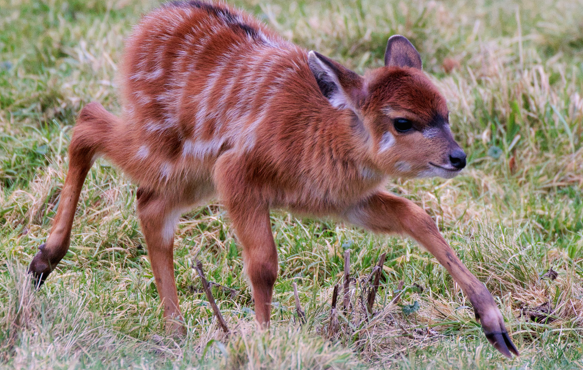A pair of cute new arrivals are settling in at Marwell Zoo following the arrival of a tiny addax calf and a special Christmas Day delivery in sitatunga form. Marwell’s Hoofstock team are looking after both animals who are growing in confidence, feeding well and venturing out with their parents when the weather allows.
Addax are Critically Endangered with only 30 - 90 mature individuals thought to survive in the wild, so Marwell’s new addition is incredibly important to the future of this rare species. The calf, who has been named Phoenix, was born to mother Amelie and father Tamarisk, on 12 December last year.
He was the second Addax to be born at the zoo in 2023 following the birth of Hanza, Phoenix’s brother earlier in the year. Marwell’s addax are named after African plants with hanza being a plant in the caper family that bears edible fruit and phoenix is a type of palm.
Sophie Wythe, Assistant Animal Keeper, said: “Phoenix is our second calf of 2023 born to mum Amelie and dad Tamerisk, which is a huge success for Marwell. Addax are Critically Endangered with less than 100 individuals left in the wild, so Phoenix will have a vital role in protecting this species from extinction."
“Phoenix is an evergreen tree found in North Africa. Phoenix’s name was chosen to follow the plant theme naming after his father Tamerisk and brothers Ephedra and Hanza. He is doing well and we are all excited to see him grow into a handsome male.”
In the wild, addax live mainly in the Sahara where they have been hunted to near extinction. Their meat, horns and hide are prized by hunters and their habitat has been eroded as a result of oil exploration and cattle farming.
Over in the zoo’s sitatunga house, expecting mother Violet had a very special Christmas Day delivery when her new addition arrived. The growing herd of sitatunga are vital for the conservation of this species due to their decreasing number in the wild. Every birth, like this soon-to-be-named female, plays a key part in protecting this species through ex situ breeding programmes.
Their coats are fluffy like wool and are actually waterproof, their splayed banana shaped hooves prevent them from sinking in boggy conditions and perhaps surprisingly, given how awkward their walk looks, they’re very good swimmers.
Related Members
-
News
.png?w=100&h=100&zc=1&f=jpeg&hash=60022dc0d0854fa23f80616d64c9376a) Sustainability in poetry - BIAZA Q&A with the author of The Rimba 17th February, 2026This week, BIAZA interviewed author Jane Griffiths and illustrator Emma Lokuciejewski on their recent book ‘The Rimba’ – a poetical…
Sustainability in poetry - BIAZA Q&A with the author of The Rimba 17th February, 2026This week, BIAZA interviewed author Jane Griffiths and illustrator Emma Lokuciejewski on their recent book ‘The Rimba’ – a poetical… -
News
.png?w=100&h=100&zc=1&f=jpeg&hash=49f40af79e569754bae2cce8fe8cd758) Binturong twins join big sister Boots at Drusillas Park 17th February, 2026Keepers at Drusillas Park are celebrating the birth of rare binturong twins, born on January 2nd, just months after their big sister Boots made history…
Binturong twins join big sister Boots at Drusillas Park 17th February, 2026Keepers at Drusillas Park are celebrating the birth of rare binturong twins, born on January 2nd, just months after their big sister Boots made history… -
News
.png?w=100&h=100&zc=1&f=jpeg&hash=97e6d151315c515d23f80e6ee9d1d533) Love is in the air as pygmy marmoset Tumble arrives at Shaldon Wildlife Trust 13th February, 2026Shaldon Wildlife Trust is celebrating a very small but very special love story this Valentine’s season with the arrival of a new female pygmy marmoset…
Love is in the air as pygmy marmoset Tumble arrives at Shaldon Wildlife Trust 13th February, 2026Shaldon Wildlife Trust is celebrating a very small but very special love story this Valentine’s season with the arrival of a new female pygmy marmoset…



